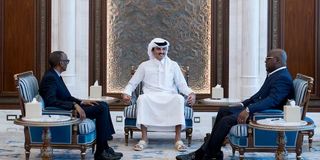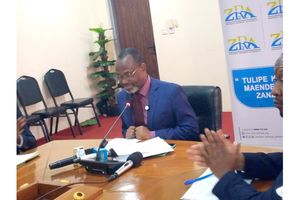Prime
DRC and M23 commit to truce pathway in Qatar talks

Democratic Republic of Congo President Felix Tshisekedi and his Rwandan counterpart Paul Kagame meet with Qatar's Emir Sheikh Tamim bin Hamad Al Thani in Doha, Qatar, March 18, 2025. Qatar's Ministry of Foreign Affairs/Handout via REUTERS
What you need to know:
- The talks mark one of the most promising attempts in recent years to address the deep-seated conflict in eastern Congo, which has seen intermittent violence for more than two decades.
Dar es Salaam. The government of the Democratic Republic of the Congo (DRC) and the rebel group known as the Congo River Alliance/March 23 Movement (AFC/M23) have agreed to a pathway toward a truce in a potential turning point for one of Africa’s most enduring and complex conflicts.
The development follows peace talks held under the mediation of the gulf state of Qatar.
In a joint communiqué issued on April 23, 2025, both parties reaffirmed their commitment to an immediate cessation of hostilities, denounced hate speech and intimidation, and pledged to uphold peace throughout the ongoing dialogue process.
“We reaffirm our commitment to an immediate cessation of hostilities,” the statement read. “We also call on all local communities to respect these commitments.”
The talks mark one of the most promising attempts in recent years to address the deep-seated conflict in eastern Congo, which has seen intermittent violence for more than two decades.
The region—rich in minerals yet wracked by insecurity—has witnessed recurring clashes between government forces and a variety of armed groups, including the M23.
The peace talks were facilitated by Qatar, a country increasingly playing a quiet but influential role in conflict resolution across Africa. Known for mediating between rival factions in Sudan, Libya, and the Sahel, Qatar’s engagement in the Great Lakes region has been welcomed by observers seeking a fresh diplomatic approach.
“The representatives of the Democratic Republic of the Congo and the AFC/M23 express their sincere gratitude to the State of Qatar for its continued efforts and unwavering commitment,” the joint statement said.
Qatar’s neutrality and diplomatic leverage with both Western and African partners may give this round of negotiations a better chance at success than previous regional-led efforts.
A longstanding crisis
The eastern DRC has long been a flashpoint of instability. The M23 rebel group, originally composed largely of Tutsi fighters, was formed in 2012 and quickly became one of the most prominent armed groups in the region. It claimed to be fighting for the rights of Congolese Tutsis and against what it called government corruption and marginalization.
After being defeated and driven into exile in 2013, the group re-emerged in late 2021 under the banner of the Congo River Alliance (AFC), intensifying clashes in North Kivu and Ituri provinces.
The resurgence prompted accusations of foreign backing, particularly from Rwanda—a claim Kigali has consistently denied, despite mounting evidence cited by the United Nations and other international observers.
The fighting has displaced more than a million people in the past three years alone and worsened the humanitarian situation in eastern Congo, where more than 120 armed groups operate in a patchwork of violence, exploitation, and insecurity.
The dialogue is expected to tackle not only the immediate security situation but also broader grievances including land rights, ethnic tensions, refugee return, and governance in the eastern provinces.
While the agreement offers a rare glimmer of hope, experts caution that the road to peace remains steep and uncertain.
In their communiqué, the DRC government and AFC/M23 appealed to religious leaders, media houses, and civil society to support and disseminate their message of peace.
“We call upon the Congolese people, faith leaders, and the media to support and spread this message of hope and peace,” said Prince Kanylika, Director of Communications for the AFC.
What next?
Though no fixed timeline for the full ceasefire implementation or the next round of talks has been announced, both sides have pledged to continue negotiations and to honor the commitments made during this initial phase.
The next few weeks will be crucial. Observers will be watching for signs of reduced violence on the ground and the establishment of mechanisms to monitor the truce.
If sustained, the agreement could signal a shift toward long-term stabilization in eastern DRC—a region whose potential has long been overshadowed by conflict.
The international community, including Tanzania and other members of the Southern African Development Community (SADC), is expected to play a supportive role in monitoring and reinforcing the peace process.





